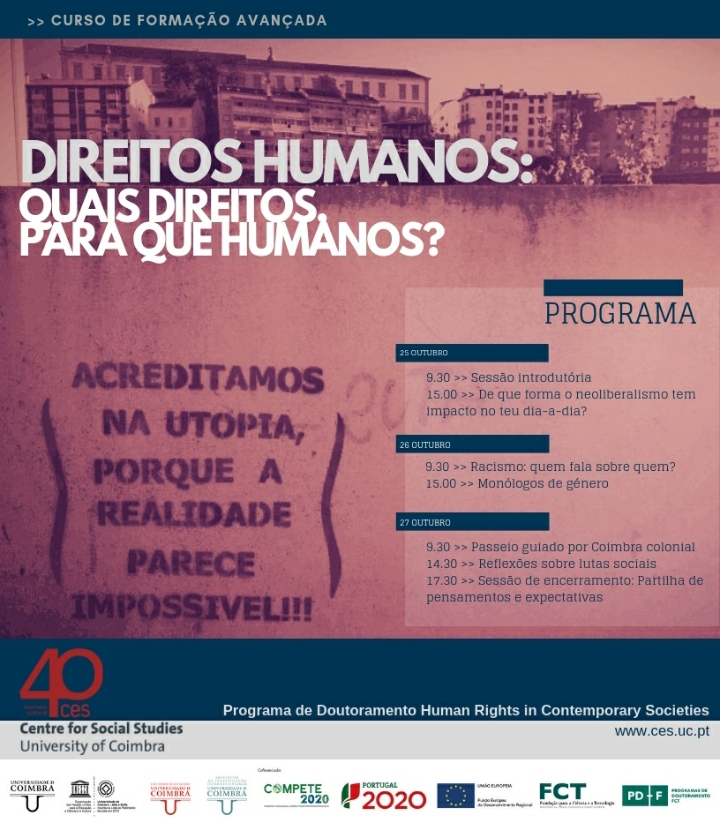Advanced Training Course
Human Rights: what rights, for which humans?
October 25 to 27, 2018, 09h30
Rooms 1 & 2, CES-Coimbra
Overview
What moves you? What makes you outraged? In which social struggles do you see yourself involved? Through five key themes and learning from the participants' experiences, the course intends to promote debates and group dynamics to bring reflections on social struggles for existing, loving, surviving, and living, and how they articulate and challenge contemporary forms of violence and oppressions. This course seeks to question the role of human rights in contemporary struggles, their limits and possibilities, focusing and reflecting on what it means to be human, and what rights are the ones considered.
Main objective: Development of a course on human rights based on a critical, intercultural, and interdisciplinary perspective, focused on the promotion of counter-hegemonic knowledges and practices.
Methodology: Starting with a critical pedagogical approach, centred on the role of different Ecologies of Knowledge and Epistemologies of the South in challenging hegemonic forms of knowledge in an attempt to decolonize the university, one of the premises of this course is the active role played by the participants, as knowledge producers, as one of the fundamental premises of this course.
- Each session is designed to be methodologically varied, interactive, and built around multiple mediums of knowledge production and counter-hegemonic approaches to human rights.
- The course is not only theoretical but also guided to action and intended to address the complexity and multiplicity of human rights in contemporaneity.
- The course will seek to widen the scope of subjects traditionally considered as relevant within the human rights discourse bringing directly the subalternized subjects, voices and struggles in a counter-hegemonic way.
Guiding principles: all sessions will explore different themes within an intersectional approach, always considering the three axes of oppression: 1. Capitalism; 2. Colonialism; 3. Cis-hetero-patriarchy.
Target audience: General public, students, academics, activists.
General structure of the course: the course will be organized in three days, divided in six sessions:
- An introductory session presenting to the participants the bases of the course (such as counter-hegemonic perspective of human rights, Ecology of Knowledge, Epistemologies of the South, among others) and some ways in which such bases are, in different ways, interconnected among all the sessions.
- The other five sessions will each explore different topics: neoliberalism; racism; decolonialism; gender; social movements. All of them emphasizing the three axes of oppression intersectionally.
- At the end of each session participants will be asked to write 2-3 take-aways/food for thought from each session and put in into a jar. After the last session, participants will be invited to post all the notes on the board, and encouraged to further reflect and discuss the activities from all three days of the course.
- Location: Centre for Social Studies (CES) and Coimbra City
- Language: The sessions will be mostly held in Portuguese. However, there will be some sessions in English and Spanish. Within the organization’s possibilities, solidarity translations will be provided.
-
Capacity: 25 people
Organization: Students from the third edition of the Doctoral Programme "Human Rights in Contemporary Societies"
Support: Doctoral Programme "Human Rights in Contemporary Societies"


